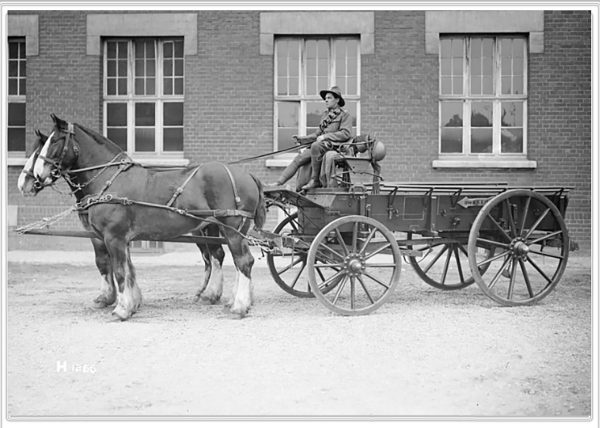
This is the seventh in a Series of Reminiscences by E. R. Brown. Brown was born in Pulaski County on August 9, 1845. His writings are abstracted from the Pulaski County Democrat on microfilm housed in the Pulaski County Public Library, Winamac, Indiana. Earlier entries can be found on our Newsletter page.
- Part one (Common Inconveniences) October 2018 newsletter.
- Part two (Land) June 2019 newsletter.
- Part three (Trees & Timber) November 2019 newsletter.
- Part four (The River) February 2020 newsletter.
Later editions are carried as separate posts.
Markets and Trading Points
Those used to modern life will find by studying the past much to wonder at with reference to early selling and buying conditions. Some years ago I spent an enjoyable day in Chicago with a worthy pioneer of White county when he related how he had once hauled wheat there from Monticello with an ox team, driving up Michigan Avenue, unloading at an elevator (then called a ‘warehouse’) at the mouth of the river and buying goods on Lake Street. That involved a laborious, tedious journey of two hundred miles and more, requiring at least ten days, over roads never very good, often very bad, through a very sparsely settled country, exposed to all kinds of weather.
Later there came to be warehouses at Michigan City and Lafayette. My mother used to tell about father hauling his first wheat to Michigan City, selling it for fifty cents the bushel and buying, among other things, two barrels of salt at $6.00 each–twelve bushels of wheat for a barrel of salt. The price for wheat was so satisfactory, however, he immediately took another load, hitching a fine, well-broken yoke of oxen in with his horse team so he could sell more. Meeting a stranger from near Valparaiso at Michigan City who wanted the oxen, he sold them for $36.00, on six months time, receiving the money afterwards when it was due. Each of these trips required four full days.
Before I was old enough to know about it, the canal was completed through Logansport with good warehouses and stores there. After that it was the main trading point for most of Pulaski county until the railroad was finished through Winamac. For most people this was not so far to go, seldom requiring more than two days for any, and could be made in less time by some who lived nearer. We counted it less than twenty-five miles from our farm and for us to make the round trip in less than two full days was unusual. To listen anxiously for the rattle of father’s wagon on the rough frozen roads, long after dark in bad winter weather when his return from Logansport was expected but long overdue, was of repeated occurrence and has never been forgotten.
Naturally numerous facts had a bearing here which might not be thought of if not mentioned. The roads of those earlier times, as related in a former article, in addition to steep ungraded hills and unbridged streams, were never free from heavy stretches–in a wet time mud and in a dry time sand. No vehicles were in use except farm wagons. Not as light running as now and wholly innocent of springs or spring seats. No rubber or fur clothing was available; heavy warm clothing of any kind not as plentiful as now and umbrellas were rare. More grave perhaps than all else, were the sudden and violent changes of weather then as now, impossible to forecast. I have myself driven a team to Logansport on a clear mild day, only to drive back the following day in a pitiless rain, or a freezing temperature. To be wet to the skin or chilled to the bone, or both, was not uncommon.
Nothing connected with that phase of early life haunts my memory in a more disturbing regretful way than of seeing my hard-working mother, not very well, seat herself on a bag of wheat, with nothing to support her back, often with a child in her arms, to make the tiresome nerve-racking journey to Logansport, she alone being deemed competent to select the necessary family supplies. Frequently the weather turned cold before her return, if not so when she started, while to be rained upon was common. My father used to insist later in life that the severe hardships incident to hauling the products of his farm to market and procuring such articles as were necessary for his farm and family had greatly undermined his health. The same was substantially true, both of women and men, with all our pioneers.
As to prices in those early years, I have a list copied from a written record, made by one who took pains to be accurate, which gives the prices of various articles at Logansport, including farm products, in the forties. Some of them are as follows: Beef 3c, Pork 2c, lard 5c, butter 8c, smoked hams 6c, smoked shoulders 5c, wheat per bushel 56c, oats 12c, flour per bbl $3,00, whiskey per gallon 19c. My impression is that these prices with slight fluctuations continued to prevail for several years later. I recall that my father once on returning from Logansport, brought two fine dressed chickens. I would say that they weighed fully five pounds each and had been beautifully prepared for the oven. When chided by my mother for buying them, when we already had so many of our own raising, he replied that a party who said he needed the money had offered both of them for twenty-five cents and he had not had the heart to refuse him.